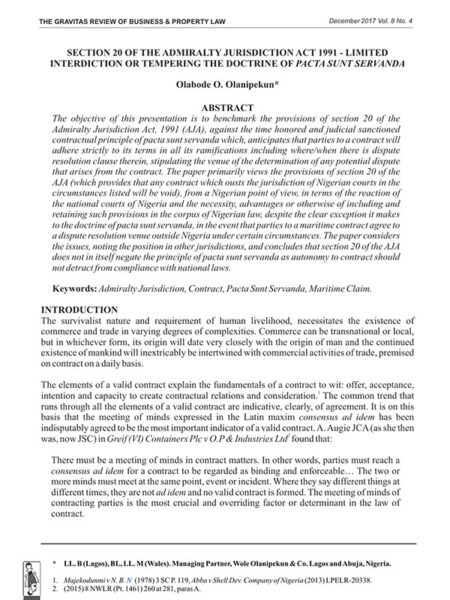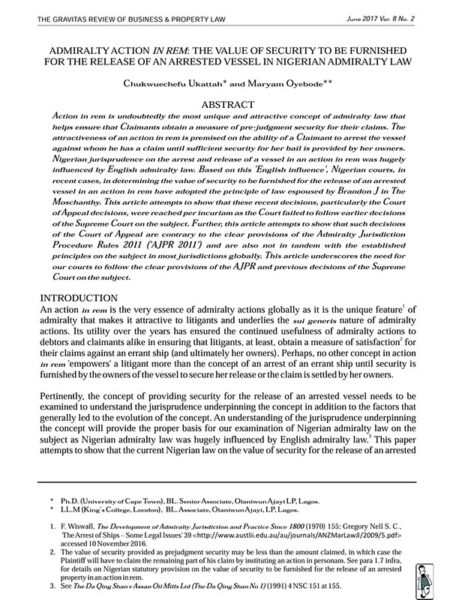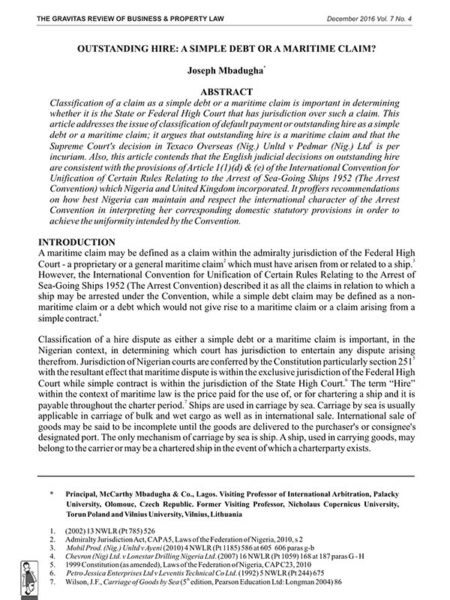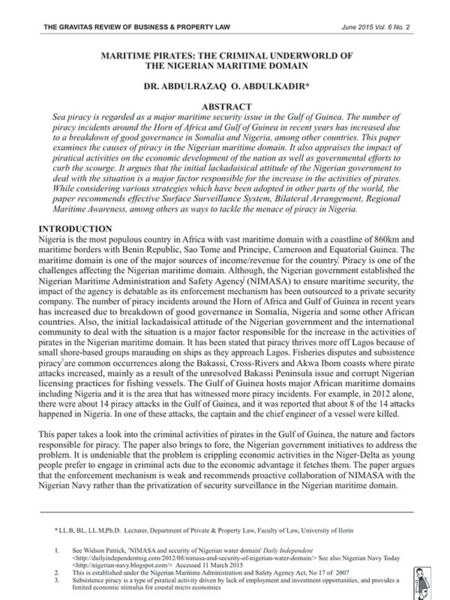-

Section 20 of the Admiralty Jurisdiction Act 1991 – Limited Interdiction or Tempering the Doctrine of Pacta Sunt Servanda
0₦2,500.00Olabode Olanipekun, Managing Partner, Wole Olanipekun & Co, in his article, “Section 20 of the Admiralty Jurisdiction Act 1991 – Limited Interdiction or tempering the Doctrine of Pacta Sunt Servanda“, benchmarks the provision of section 20 of the Admiralty Jurisdiction Act, 1991, which invalidates any contractual provision that ousts the jurisdiction of Nigerian courts in the circumstances listed in the section, against the time honored and judicial sanctioned contractual principle of pacta sunt servanda, which anticipates that parties to a contract will adhere strictly to its terms in all its ramifications including the venue of the determination of any dispute that arises from the contract. He reviews the issues against the background of decided cases, noting the position in other jurisdictions, and concludes with a thought on the Hamburg Rules and dispute resolution.
-

Admiralty Action in Rem: The Value of Security to be Furnished for the Release of an Arrested Vessel in Nigerian Admiralty Law
0₦2,500.00Dr Chukwuechefu Ukattah and Maryam Oyebode, Associates at Olaniwun Ajayi LP in their article “Admiralty Action in Rem: The Value of Security to Be Furnished for The Release of An Arrested Vessel in Nigerian Admiralty Law”, argue that an important attractiveness of an action in rem is the ability of a Claimant to arrest the vessel against whom he has a claim until sufficient security for her bail is provided by her owners. There have been discordant tunes among the courts on the value of the security to be furnished for an arrested vessel. The article argues that recent decisions by the Nigerian Court of Appeal, heavily influenced by the decision of Brandon J in the English case of The Moschanthy, were reached per incuriamas the Court failed to follow earlier decisions of the Supreme Court on the subject, and are contrary to the clear provisions of the Admiralty Jurisdiction Procedure Rules 2011.
-

Outstanding Hire: A Simple Debt or Maritime Claim?
0₦2,500.00Joseph Mbadugha of McCarthy Mbadugha & Co and former Visiting Professor, Nicholaus Copernicus University of Torun Poland and at Vilnius University, Vilnius, Lithuania in his article “Outstanding Hire: A Simple Debt or A Maritime Claim?” examines the classification of a claim as either a simple debt or a maritime claim and its implication on whether it is the State or Federal High Court that has jurisdiction over such a claim. He argues that despite the domestication of Article 1(1)(d) & (e) of the International Convention for Unification of Certain Rules Relating to the Arrest of Sea-Going Ships 1952 (The Arrest Convention) in Section 2(3)(f) of the Nigerian Admiralty Jurisdiction Act 1991 (AJA) an in 20(2)(h) of the English Supreme Court 1981, only the English Courts have stayed true to the spirit of the Convention. He argues that the Supreme Court decision in Texaco Overseas (Nig.) Unltd v Pedmar (Nig.) Ltd in blurring the distinction between a Charterparty and a Bill of Lading Contract, was reached per incuriam.
-

Maritime Pirates: The Criminal Underworld of the Nigerian Maritime Domain
0₦2,500.00Dr. Abdulkadir examines the causes of piracy in the Nigerian maritime domain in his article, Maritime Pirates: The Criminal Underworld of the Nigerian Maritime Domain. He also appraises the impact of piratical activities on the economic development of the nation as well as governmental efforts to curb the scourge. The article argues that the initial lackadaisical attitude of the Nigerian government to deal with the situation is a major factor responsible for the increase in the activities of pirates. While considering various strategies which have been adopted in other parts of the world, the paper recommends effective Surface Surveillance System, Bilateral Arrangement, Regional Maritime Awareness, among others as ways to tackle the menace of piracy in Nigeria
The Gravitas Review of Business & Property Law



